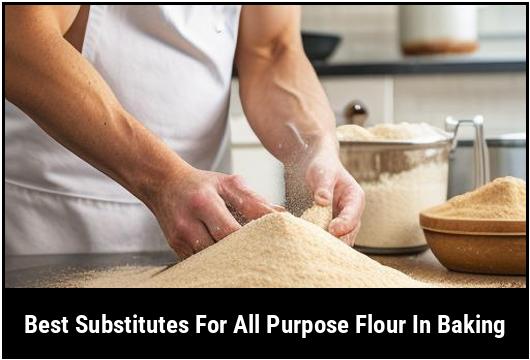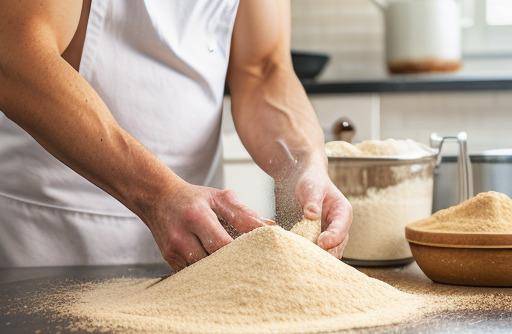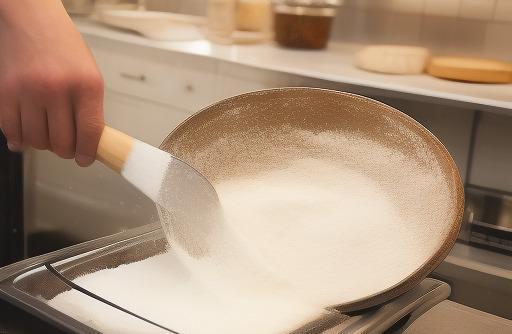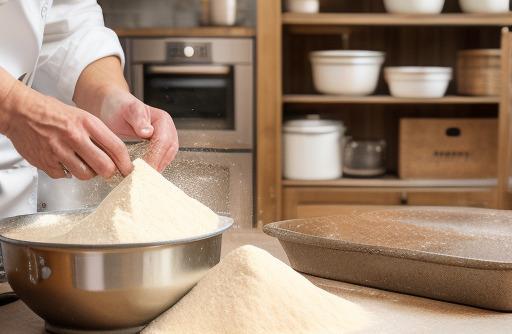Best Substitutes For All Purpose Flour In Baking

All-purpose flour is a versatile ingredient that is commonly used in baking. It contains a moderate level of protein, which gives baked goods structure and helps them rise. However, there are many reasons why you might need to find a substitute for all-purpose flour. You may have a gluten sensitivity or allergy, or you may want to experiment with new flavors and textures in your baking. Fortunately, there are a variety of alternatives available that can be used as substitutes for all-purpose flour in baking.
Key Takeaways
- All-purpose flour is commonly used in baking for its versatility and protein content.
- There are several reasons why you might need a substitute for all-purpose flour, such as gluten sensitivity or a desire for new flavors and textures.
- Some of the best substitutes for all-purpose flour in baking include almond flour, coconut flour, oat flour, and gluten-free flour blends.
- Choosing the right substitute depends on the desired texture, flavor, and dietary needs of your recipe.
- When using substitutes for all-purpose flour, you may need to adjust the amount of liquid or leavening agents in your recipe.
- Experiment with different substitutes and ratios to find the perfect alternative for your baking needs.
Why You Need A Substitute For All Purpose Flour In Baking
There are several reasons why you might need a substitute for all-purpose flour in your baking endeavors:
Gluten Sensitivity Or Allergy
One of the most common reasons for seeking a substitute for all-purpose flour is gluten sensitivity or allergy. Gluten is a protein found in wheat, barley, and rye, which can cause digestive issues for some individuals. If you or someone you are baking for has a gluten sensitivity or allergy, it is important to find a suitable alternative.
Dietary Restrictions Or Preferences
Another reason to seek a substitute for all-purpose flour is dietary restrictions or preferences. Some individuals may be following a low-carb or paleo diet and want to avoid traditional grain-based flours. Others may be looking to incorporate new flavors and textures into their baking. Whatever the reason, there are plenty of substitutes available to cater to different dietary needs.
Variety And Experimentation
Using a substitute for all-purpose flour can open up a world of new flavors and textures in your baking. Different flours have unique tastes and properties, allowing you to create delicious and unconventional treats. By experimenting with substitutes, you can expand your culinary horizons and surprise your taste buds.
Types Of Substitutes For All Purpose Flour In Baking

There are several types of substitutes for all-purpose flour that can be used in baking:
Almond Flour
Almond flour is made by grinding blanched almonds into a fine powder. It is a popular choice for gluten-free baking due to its mild, nutty flavor and high protein content. Almond flour adds moisture and tenderness to baked goods, making it an excellent substitute for all-purpose flour in recipes such as cookies, cakes, and muffins.
Coconut Flour
Coconut flour is made from dried coconut meat that has been ground into a fine powder. It is highly absorbent and has a slightly sweet taste. Coconut flour is an excellent substitute for all-purpose flour in recipes that require a drier texture, such as bread and cookies. It is also rich in fiber and protein, making it a nutritious choice.
Oat Flour
Oat flour is made by grinding rolled oats into a powder. It has a mild, slightly sweet flavor and a soft, delicate texture. Oat flour can be used as a substitute for all-purpose flour in recipes such as pancakes, cookies, and bread. It adds moisture and a slightly chewy texture to baked goods.
Gluten-Free Flour Blends
Gluten-free flour blends are pre-mixed combinations of gluten-free flours and starches. They are designed to mimic the properties of all-purpose flour and can be used as a 1:1 substitute in most recipes. Gluten-free flour blends usually contain a combination of flours such as rice flour, tapioca flour, and potato starch. They are a convenient option for those with gluten sensitivities or allergies.
Other Grain-Based Flours
There are a variety of other grain-based flours that can be used as substitutes for all-purpose flour in baking. Some examples include:
- Rice flour: Rice flour is finely ground rice and is often used in gluten-free baking. It has a mild, slightly sweet flavor and can be used in a wide range of recipes.
- Buckwheat flour: Despite its name, buckwheat is not related to wheat and is gluten-free. Buckwheat flour has a rich, nutty flavor and is often used in pancakes, waffles, and bread.
- Quinoa flour: Quinoa flour is made from ground quinoa seeds and has a slightly nutty flavor. It is high in protein and fiber and can be used as a substitute for all-purpose flour in various recipes.
- Chickpea flour: Chickpea flour, also known as gram flour, is made by grinding dried chickpeas. It has a nutty flavor and a high protein content, making it an excellent choice for gluten-free baking.
Best Substitutes For All Purpose Flour In Baking
Now that we have explored the different types of substitutes for all-purpose flour, let’s delve into the best options for specific baking needs:
1. Best Substitute For Texture: Almond Flour
Almond flour is an excellent substitute for all-purpose flour when you want to achieve a moist and tender texture in your baked goods. It works particularly well in recipes like cookies, cakes, and muffins. Almond flour adds a subtle nutty flavor and a delicate crumb to your bakes. Keep in mind that almond flour does not have the same binding properties as all-purpose flour, so it is recommended to combine it with other flours or use eggs as a binder.
2. Best Substitute For Low-Carb Diets: Coconut Flour
Coconut flour is a great substitute for all-purpose flour if you are following a low-carb or gluten-free diet. It is high in fiber, low in carbs, and imparts a slightly sweet taste to baked goods. Coconut flour is particularly suitable for recipes that require a drier texture, such as bread and cookies. However, it is important to note that coconut flour absorbs more liquid than all-purpose flour, so you may need to adjust the amount of liquid in your recipe.
3. Best Substitute For A Light And Fluffy Texture: Oat Flour
Oat flour is an ideal substitute for all-purpose flour when you want to achieve a light and fluffy texture in your baked goods. It adds moisture and a slightly chewy consistency to recipes like pancakes, cookies, and bread. Oat flour has a mild, slightly sweet flavor that pairs well with various ingredients. It is worth noting that oat flour is not suitable for those with celiac disease, as oats can be cross-contaminated with gluten during processing. Look for certified gluten-free oat flour if you have gluten sensitivities or allergies.
4. Best 1:1 Substitute: Gluten-Free Flour Blends
If you are looking for a hassle-free 1:1 substitution for all-purpose flour, gluten-free flour blends are your best bet. These pre-mixed blends are specifically formulated to mimic the properties of all-purpose flour and can be used as a direct substitute in most recipes. They offer convenience and reliability, making them an excellent choice for those with gluten sensitivities or allergies. Experiment with different brands and blends to find the one that suits your taste and dietary needs.
5. Best Substitute For Unique Flavors: Other Grain-Based Flours
If you are feeling adventurous and want to explore unique flavors and textures in your baking, consider experimenting with other grain-based flours. These flours, such as rice flour, buckwheat flour, quinoa flour, and chickpea flour, offer distinct tastes and properties that can elevate your baked goods. They work well in a variety of recipes, from pancakes to bread. Be mindful of each flour’s individual characteristics and adapt your recipe accordingly.
Choosing The Right Substitute For All Purpose Flour In Baking

Choosing the right substitute for all-purpose flour depends on several factors, including the desired texture, flavor, and dietary needs of your recipe. Here are a few things to consider:
Texture
Consider the texture you want to achieve in your baked goods. If you are looking for a moist and tender texture, almond flour is an excellent choice. For a drier texture, coconut flour is a suitable option. If you want a light and fluffy texture, oat flour is the way to go. Experiment with different flours to find the one that best suits your preferences.
Flavor
Think about the flavor profile you want to impart to your baked goods. Almond flour adds a subtle nutty flavor, coconut flour has a hint of sweetness, and oat flour has a mild, slightly sweet taste. Other grain-based flours, such as buckwheat, quinoa, and chickpea, offer their own distinct flavors. Consider how these flavors will complement the other ingredients in your recipe.
Dietary Needs
Take into account any dietary restrictions or preferences when choosing a substitute for all-purpose flour. If you need a gluten-free option, almond flour, coconut flour, oat flour, and gluten-free flour blends are suitable choices. If you are following a low-carb or paleo diet, coconut flour is a good option. Consider your specific dietary needs and choose accordingly.
Cooking With Substitutes For All Purpose Flour In Baking
When using substitutes for all-purpose flour in baking, it is important to be aware of a few key tips:
Experiment With Ratios
Different flours have varying properties, so it may take some experimentation to find the right ratio for your recipe. Start by substituting a portion of the all-purpose flour with the alternative flour and adjust from there. Keep track of your proportions and make note of any changes you make to achieve the desired texture and taste.
Adjust Liquid Content
Some substitutes, such as coconut flour and oat flour, absorb more liquid than all-purpose flour. If you are using these substitutes, you may need to increase the amount of liquid in your recipe to compensate. Pay attention to the consistency of your batter or dough and adjust accordingly.
Leavening Agents
Certain substitutes may interact differently with leavening agents, such as baking powder and baking soda. For example, coconut flour may require extra leavening to help your baked goods rise. Be mindful of how your substitute choice might affect the leavening agents in your recipe and make adjustments as necessary.
Pro Tip:
When using almond flour as a substitute for all-purpose flour, combine it with other flours or use eggs as a binder to ensure the proper texture and structure of your baked goods.
Recipes Using Substitutes For All Purpose Flour In Baking

Here are a few delicious recipes that incorporate substitutes for all-purpose flour:
Almond Flour Chocolate Chip Cookies
These gluten-free chocolate chip cookies are made with almond flour, giving them a tender and nutty flavor. Mix together 2 ½ cups of almond flour, ½ teaspoon of baking soda, ¼ teaspoon of salt, ½ cup of softened butter, ½ cup of granulated sugar, ½ cup of brown sugar, 1 teaspoon of vanilla extract, and 1 cup of chocolate chips. Drop spoonfuls of dough onto a baking sheet and bake at 350°F (175°C) for 10-12 minutes, or until golden brown around the edges.
Coconut Flour Banana Bread
This paleo-friendly banana bread is made with coconut flour, resulting in a moist and flavorful loaf. In a bowl, combine ½ cup of coconut flour, ½ teaspoon of baking soda, ½ teaspoon of salt, ½ teaspoon of cinnamon, 4 ripe mashed bananas, 4 eggs, ¼ cup of melted coconut oil, and ¼ cup of honey. Pour the batter into a greased loaf pan and bake at 350°F (175°C) for 45-50 minutes, or until a toothpick inserted into the center comes out clean.
Oat Flour Pancakes
These fluffy and nutritious pancakes are made with oat flour and are perfect for a hearty breakfast. In a bowl, whisk together 1 ½ cups of oat flour, 2 tablespoons of sugar, 2 teaspoons of baking powder, and ¼ teaspoon of salt. In a separate bowl, whisk together 1 ¼ cups of milk, 2 eggs, and 2 tablespoons of melted butter. Pour the wet ingredients into the dry ingredients and whisk until just combined. Cook the pancakes on a greased griddle or pan until golden brown on both sides.
Gluten-Free Flour Blend Chocolate Cake
This moist and indulgent chocolate cake is made with a gluten-free flour blend, making it suitable for those with gluten sensitivities or allergies. Combine 2 cups of gluten-free flour blend, 2 cups of granulated sugar, ¾ cup of cocoa powder, 2 teaspoons of baking powder, 1 ½ teaspoons of baking soda, 1 teaspoon of salt, 1 cup of buttermilk, ½ cup of vegetable oil, 2 eggs, 2 teaspoons of vanilla extract, and 1 cup of boiling water. Mix until well combined and pour the batter into greased cake pans. Bake at 350°F (175°C) for 30-35 minutes, or until a toothpick inserted into the center comes out clean.
Storage And Shelf Life Of Substitutes
It is important to store substitutes for all-purpose flour properly to ensure their freshness and shelf life. Here are some general guidelines:
- Almond flour: Store in an airtight container in a cool, dry place for up to 6 months.
- Coconut flour: Store in an airtight container in the refrigerator or freezer for up to 1 year.
- Oat flour: Store in an airtight container in the refrigerator or freezer for up to 3 months.
- Gluten-free flour blends: Follow the storage instructions provided by the manufacturer.
Always check the expiration dates on the packaging and discard any flour that has gone bad or developed an off smell.
Conclusion
Finding a substitute for all-purpose flour in baking doesn’t have to be a daunting task. With the wide range of options available, you can cater to different dietary needs and experiment with new flavors and textures. Whether you choose almond flour, coconut flour, oat flour, gluten-free flour blends, or other grain-based flours, there is a substitute out there that will elevate your baking endeavors. Remember to adjust your ratios, consider the desired texture and flavor, and enjoy the creative process of discovering new culinary possibilities. Happy baking!
FAQS
What Is All-purpose Flour Used For In Baking?
All-purpose flour is a versatile baking staple that is commonly used as a base ingredient in a variety of baked goods such as cookies, cakes, bread, and pies. It provides structure and texture to baked goods and helps them rise.
What Are Some Common Substitutes For All-purpose Flour In Baking?
There are several substitutes that can be used in place of all-purpose flour such as almond flour, coconut flour, oat flour, spelt flour, and rice flour. Each of these flours has their own unique texture and flavor, so it’s important to experiment with them to see which works best for the recipe you’re making.
Is It Possible To Substitute All-purpose Flour With Gluten-free Flour Blends?
Yes, it is possible to substitute all-purpose flour with gluten-free flour blends such as those made from rice flour, potato starch, and tapioca flour. These flour blends are specially created to mimic the texture and baking properties of wheat flour, making them ideal for gluten-free baking.
Can I Use Whole Wheat Flour As A Substitute For All-purpose Flour In Baking?
Yes, you can use whole wheat flour as a substitute for all-purpose flour in some recipes, but keep in mind that the texture and flavor of the baked goods will be different. Whole wheat flour has a different texture and produces a denser final product, so it’s best to start with a small amount and gradually increase the amount depending on the recipe.
Are There Any Other Non-flour Alternatives To Consider When Looking For Substitutes For All-purpose Flour In Baking?
Yes, there are some non-flour alternatives that can be used in place of all-purpose flour such as mashed bananas, sweet potatoes, and pumpkin puree. These ingredients can add moisture and flavor to baked goods and are often used in recipes for gluten-free and dairy-free baking.
Sources
About the Author Jenny
I'm Jenny, a housewife with an unwavering passion for food. My culinary journey began with my grandmother's kitchen, and it's now a full-fledged food blog. I've turned my love for cooking into a creative outlet, sharing recipes and stories with a global community of fellow food enthusiasts. It's proof that being a housewife can also mean pursuing your passions and savoring life's delectable moments.
